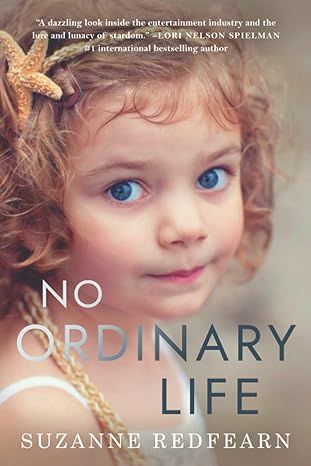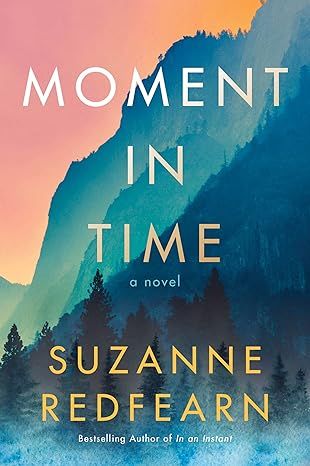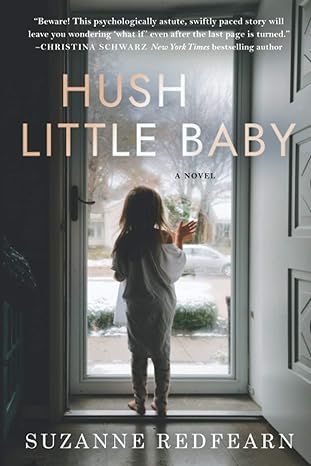No Ordinary LifePaperback
4.2
-
3,041 ratings
Faye Martin never expected her husband to abandon her and their three children . . . or that she'd have to struggle every day to make ends meet. So when her four-year-old daughter is discovered through a YouTube video and offered a starring role on a television series, it seems like her prayers have been answered. But when the reality of their new life settles in, Faye realizes that fame and fortune don't come without a price. In a world where everyone is an actor and every move is scrutinized by millions, it's impossible to know whom to trust, and Faye finds herself utterly alone in her struggle to save her family. Emotionally riveting and insightful, NO ORDINARY LIFE is an unforgettable novel about the preciousness of childhood and the difficult choices a mother needs to make in order to protect this fragile time in her children's lives.
Kindle
$0.00
or $9.99 to buy
Audiobook
$0.00
with membership trial
Paperback
$15.87
Audio CD
$8.19
Ships from
Amazon.com
Payment
Secure transaction
ISBN-10
1708468110
ISBN-13
978-1708468118
Print length
314 pages
Language
English
Publisher
Independently published
Publication date
December 02, 2019
Dimensions
6 x 0.79 x 9 inches
Item weight
1.03 pounds
Product details
ASIN :
B082J97VVF
File size :
1574 KB
Text-to-speech :
Enabled
Screen reader :
Supported
Enhanced typesetting :
Enabled
X-Ray :
Enabled
Word wise :
Enabled
Editorial reviews
"Redfearn takes readers on an engaging...view of celebrity. Redfearn writes at a fast clip, short chapters filled with witty dialogue and action. The result is a well-paced tale."―Fort Worth Star-Telegram
"Top Pick! From a deeply emotional place, Redfearn writes with a beautiful rawness that captures the emotions of the characters. Steady pacing, heartfelt dialogue and intense conflict make this story an extraordinary read."―RT Book Reviews
"Suzanne Redfearn's NO ORDINARY LIFE is a gripping exploration of a mother's love and the lengths she'll go to protect her children. Redfearn honestly captures one family's meteoric rise and heartbreaking undoing. Compulsively readable, this poignant story will stay with readers long after the last page is turned."―Heather Gudenkauf, New York Times bestselling author of The Weight of Silence
"Redfearn specializes in tales of families in crisis... Fans of Steena Holmes and Amy Hatvany will appreciate Redfearn's family drama."―Booklist
"Redfearn...writes with insight and empathy; this book is more nuanced than most domestic thrillers"―The Sunday Star
"Once again, Suzanne Redfearn delivers a fast-paced, compelling story of family, frustration, and the unexpected consequences of a mother's choice. NO ORDINARY LIFE provides a dazzling look inside the entertainment industry, illustrating both the lure and lunacy of child stardom. A gripping story, with twists and turns...and characters I felt close to and rooted for."―Lori Nelson-Spielman, international bestselling author of The Life List
Read more
Sample
1
Molly and I sit outside the principal’s office, my eyes staring at my hands in my lap like a defendant awaiting a verdict. Molly’s pudgy legs stick off the plastic seat, her pink Crocs bouncing up and down in rhythm with the beat of the class singing in the auditorium beside the office. The soles are too short for her feet, her heels extending a quarter inch beyond the edges.
She needs new shoes. I should have bought her new shoes. Suddenly embarrassed, I want her to stop bouncing her legs and drawing attention to the evidence of my maternal failing. My eyes slide to the school secretary. Mercifully, the woman types on her computer, completely oblivious to Molly’s too-small shoes and my parental incompetence.
The door on the other side of the room opens, and Tom walks through, his eyes on the ground as he shuffles shamefully forward. The school counselor walks two feet behind, her face turned up haughtily. She’s the one who called an hour ago to tell me Tom had gone missing after lunch, which in turn sent the entire campus into lockdown. Half an hour later he was found in an empty classroom, sitting on the floor reading, entirely unaware of the commotion he had caused.
I pull Tom to me, and he buries his face against my hip. Smoothing his honey hair, I open my mouth to say something—stutter an apology or an excuse—but already the counselor has turned and is walking back toward her office.
I lift Tom’s face so he is looking at me, his blue eyes so sorry it makes my heart hurt. “Darn cat,” I say, our secret code for the anxiety that wraps around his vocal cords like a serpent whenever he’s confronted with a new or difficult social situation, an expression coined from the saying “Cat got your tongue?”
He nods and again buries his face against my jeans, his desire to disappear so palpable I wish I were a magician and could make the wish come true, zap him onto the couch at home and put a mug of steaming hot cocoa in his hands.
The social anxiety disorder Tom suffers from is called selective mutism, an insipid label suggesting that he chooses to be silent. Which is ridiculous. No eight-year-old would choose to be a misfit other kids make fun of, an outcast unable to voice his opinions or defend himself when he is called stupid, crazy, or a scaredy-cat. Tom is none of those things, and he certainly doesn’t choose to be silent so he can be thought of that way. It should be called something more like verbal abandonment, his voice literally deserting him as soon as he steps from our van, as if his tongue has been cut from his throat, his ability to speak ripped away, and no matter how desperately he wants to, he is suddenly, inexplicably rendered mute.
“Mrs. Martin?”
I turn to see the school secretary beside us.
“Dr. Keller will see you now.”
“Tom, take Molly and wait for me in the van,” I say, dropping a kiss on his head and handing him my keys.
I feel his sigh of relief as he takes Molly by the hand and leads her toward freedom.
“I get to choose the music,” Molly says, immune to the worry around her.
I follow the secretary to the principal’s office and am surprised when I walk in to find another woman already seated in one of the two chairs across from Dr. Keller’s desk. The woman stands, and I need to crane my neck to greet her. Taller than me by at least ten inches and thin as Gandhi, her height is exaggerated by the two-inch pumps she wears, which are perfectly matched to her navy suit, and I’m amazed she can stay upright on her two spindly legs.
I give her extended hand a weak shake, feeling short and disheveled in my T-shirt, jeans, and worn-out Jack Purcells.
“Elizabeth Glenn,” she says, as if it explains why she is here.
I look at Dr. Keller in confusion.
“Ms. Glenn is from Children and Family Services,” the principal says, causing my heart to ricochet in my chest before it lodges in my throat, making it impossible to respond.
“I called her because we are concerned about Tom,” Dr. Keller continues.
“Where is Tom?” Ms. Glenn interrupts, looking around me as if I might be concealing him.
“I sent him to wait in the car,” I manage. “With my daughter.”
“Your older daughter?” she says.
“No. My younger one.”
Ms. Glenn opens the manila folder in her hand and scans it. “Your daughter Molly?”
I nod.
“Your four-year-old?”
I nod again, causing the woman’s eyes to bulge. “You sent your eight-year-old with your four-year-old to the car by themselves?”
Heat rises in my face, and the pounding in my chest intensifies until it thumps like cannon fire in my ears.
Dr. Keller stands from behind her desk and brushes past me. “Candice, please go to the parking lot and bring Tom and his sister back to the office. Then please keep an eye on them until we’re finished.”
I want to defend myself. The van is parked right outside, in the spot beside the sidewalk. The windows are open. The school is not a dangerous place. Tom and Molly will be more comfortable in the van listening to the radio than sitting in the office doing nothing, with Tom staring at the door aware that we are discussing him. His problems stem from social anxiety associated with the school, and he is phobic about attention being focused on him. I was being a good mom.
Of course, I say none of these things. The thoughts remain in my head as most of my thoughts do, where I bury them behind the regret that comes from not speaking up when I should. It’s not difficult to trace the roots of Tom’s shyness. Though I don’t have an anxiety disorder, I certainly have anxiety. At the slightest provocation, my tongue grows thick, and at the first sign of conflict, my brain shuts down. And at this moment, I am suffering an acute attack of both afflictions, my indignation buried deep beneath my cowardice.
Dr. Keller returns to her seat, and Ms. Glenn smooths her skirt, both women puffing with superiority.
“Faye, please sit,” Dr. Keller says.
I don’t want to sit. What I want is to flee. Already I’ve failed whatever test I needed to pass in order to avoid Family Services infiltrating my life, and desperately I want to avoid whatever repercussions are to follow. I feel like I’ve been ambushed. The counselor led me to believe I was in for the same lecture I’ve been given the last three times I was called in to discuss Tom’s issues—Tom is not improving as much as we would like…His issues cannot be ignored…Have you been taking him to therapy as we suggested?…blah, blah, blah. You need to do this. You need to do that…This is all your fault.
Dr. Keller sighs through her nose, and I lower myself into the remaining chair.
“First, I want to say we’re on your side.”
Deadly beginning.
“All of us have Tom’s best interests in mind.”
“May I ask where Mr. Martin is?” Ms. Glenn interrupts again with the annoying habit she has of stopping the flow of conversation to look for missing members of my family. “I had hoped both of you would be here. This is important.”
As if I don’t know this is important. My son doesn’t talk, and he locked himself in a room so he wouldn’t have to go chorus where he would be asked to sing out loud.
“Faye?” Dr. Keller says, making me realize I haven’t responded.
“He’s on the road,” I say in the voice I call my waitressing voice because it’s the voice I use when I work. The voice is strangely flat and staccato, but it’s the only one I can manage when I’m stressed. Sean thinks it’s sexy because it’s low and sultry. The kids think it’s weird, which it is. “He’s a truck driver.”
This is almost the truth except for the omission about Sean leaving five months ago for a one-week trip and not returning since.
Ms. Glenn frowns, her mouth tight and her nose pinched. “Mrs. Martin, Tom needs help, professional help.”
Professional help that costs $120 an hour, and that he needs to go to three times a week to be effective.
I look back at my hands in my lap, my heart pounding with guilt and defeat as I mumble, “I’ll get him into therapy.”
It’s a promise I’ve made from this very spot three times before, and it sounds false even to my own ears. And Ms. Glenn’s response is so quick I know her answer would have been the same regardless of what I said. “While I’m sure your intentions are sincere, my job is to ensure Tom’s welfare. So unfortunately, at this point, we are going to need more than your word. I’ve opened a case file, and from this point on, I will personally be monitoring the situation. Dr. Keller will keep me apprised of Tom’s progress in school, and I’ll need to visit your home to get a better understanding of his life outside the classroom.”
“That’s not necessary,” I blurt, my voice spilling out with my panic. “Selective mutism isn’t caused by abuse or neglect. It’s like stuttering. It can happen to anyone. Tom’s problem has nothing to do with his home life.” I’m quite aware of how I sound, like I’m completely freaked out at the idea of her visit. Which I am. But it’s also the truth. I may not have the money for therapy, but I’ve read every book on selective mutism there is. Tom’s issue wasn’t triggered by anything we did. It’s simply who he is, like a child born with bad eyesight, except the cure isn’t as easy or straightforward as buying glasses.
Dr. Keller speaks up, her voice sympathetic. “Faye, we know you’re a good mom, and we’re not saying Tom’s issues stem from you or Sean. It’s just standard procedure. When a case is opened, the home environment needs to be investigated.”
Investigated! The word causes my heart to stop, and I wish she’d go back to using the word “visit.” Molly’s too-small Crocs irrationally fill my brain, blinding me with the thought of how many other deficiencies will be discovered if this woman comes into my home. I don’t think we have anything to hide, no more than any other family, but like cramming your mess into a closet, even if you’re pretty sure everyone does it, you still don’t want anyone opening the door.
“I’d like Mr. Martin to be there as well so I can meet him,” Ms. Glenn says. “When will he be returning?”
My mouth skews sideways as I shrug and give a noncommittal answer. “Hard to say. Sometimes he picks up new jobs on the road.”
Looking up through my brow, I see Dr. Keller studying me, her mouth in a tight line, her radar for deceit finely tuned from dealing with preadolescent delinquents every day.
Ms. Glenn stands and holds out a business card. “Call me when he gets back.” Halfway to the door, she stops. “One more thing. An eight-year-old and a four-year-old should never be left in a car alone.”
She continues on, her condescension trailing behind her like a bad odor, and when the door clicks closed behind her, Dr. Keller says, “Faye, I know you’re doing your best, but three kids is a lot to deal with on your own, especially when one has special needs.”
The words “special needs” stick like a burr. Tom is perfect, was perfect. Until he started school, he was my perfect little boy—shy and perhaps a bit reticent, but sweet, loving, and happy, blissfully oblivious to the world beyond his own and how difficult and cruel it could be.
“Sean seems to be gone a lot. Maybe you need some help. Is there family nearby who can give you a hand?”
I give a thin smile and nod. Another lie, but who’s counting?
2
“Family Services, whooee,” Bo says, looking up from the awl he’s using to make a new hole in the harness on his lap.
Bo, owner of Bojangles Stables, is my unlikely best friend. Five foot six on a tall day, a day when his arthritis isn’t acting up and crimping him at the waist, he’s black and wrinkled as an overripe raisin, has an opinion about everything, and isn’t afraid to share it. He was the first person I met when Sean and I moved to Yucaipa twelve years ago, and he has been a part of my life ever since.
“Ain’t those the people they call on Law and Order when they find kids chained to their beds and eating cat food?”
“You’re not helping.”
“Sure I am. I’m telling you that going to live with your mom to avoid Family Services is a good idea. Your mom is good people.”
It’s been two days since my meeting at the school, the threat of Ms. Glenn’s visit compelling me to finally make the decision I’ve been putting off for months.
“My mom and I can’t survive five minutes together. How am I going to live with her?”
“Because there ain’t no other choice. Sean’s not coming back, and you’re in a pickle. That’s life, full of more pickles than cucumbers, but that’s the way it is.”
“He called last night,” I say, causing Bo’s hairless brows to rise. “You talk to him?”
I shake my head. “I hung up.”
Bo nods his approval and returns to his work.
I smooth the muzzle of the horse in the stall beside me and bite back the tears that have threatened every other second since I hung up the phone.
“Hey, beautiful,” he said when I answered, the greeting slow and gravelly, thick with drink and emotion. In the background, there was traffic, and instinctively I wondered where he was. It had been a favorite game of ours, me guessing where he was calling from. Before he would leave for a trip, I would memorize his route, tracing it with my finger in our old atlas and reciting the names of the towns he’d be driving through so, when he called, my guess would be close.
Last night I didn’t guess. I said nothing, the whoosh of cars and trucks behind him filling the silence.
“How are they?” he said finally, and that’s when I hung up.
“You tell him you was leaving?” Bo asks, working another hole through the tough leather, his hands impressively deft and strong for a man so old
“I told you, I hung up,” I snap.
A smile plays on his thick lips. “Finally getting some fire in your belly. That’s good.”
I sneer at him, and his smile grows.
“Mom, look,” Molly says, waddling into the barn, the bib of her overalls stuffed with apricots, grinning like she just scored a touchdown in the Super Bowl. Gus, our mangy mutt, stands beside her, his tail wagging as if he had something to do with the accomplishment.
“Theyw’re for Mischief,” she says proudly, sticking out her lumpy belly.
Mischief is a horse that doesn’t belong to Emily, my oldest, but who Emily thinks of as hers.
“Are Em and Tom awlmost home?” Molly asks, toddling forward awkwardly, her arms wrapped around her stash.
I look at my watch. “A few more minutes. Should we wait for them by the road?”
“Okey dokey, jokey smokey,” she says, spinning around to change direction, the extra weight throwing off her center of gravity and pulling her around quicker than she expects, causing her to topple and lose her load.
She busts up laughing as Gus leaps around, barking with delight. Bo and I laugh with her. The kid is downright hilarious.
Molly frowns when she puts the last apricot back in her bib and it causes another to pop out. She does it again with the same result, then again and again, making herself smile with the game. I swear the kid can make fun out of anything.
“How about we give this one to Mitsy?” I say, snatching the one that just plopped on the ground.
“Sounds like a plan, Stan.”
I hold the apricot out to the mare beside me, and the horse gobbles it up, and again I need to pinch my nose to stop the emotions. In two days, we will be gone—no more apricots, no more horses, no more Bo.
“It’s not forever,” Bo says, reading my thoughts.
“What’s not fowrever?” Molly asks.
“Nothing, baby,” I say quickly, painting on a smile. “Let’s go wait for Em and Tom.”
I have yet to tell the kids we’re leaving. I thought about breaking the news last night but decided to give it one more day. Today is Friday, our favorite day, the day Emily gets to ride Mischief and the day the neighbors come to the stables when the sun goes down for a weekly cookout. Tomorrow is soon enough to tell them we’re leaving the only life they’ve ever known.
We get to the corner as the bus wheezes to a stop. The door opens and Tom ambles down first, his head bent so his gold hair drapes across his face. His backpack dangles from his narrow shoulder, his hands shoved in the pockets of his jeans.
�“Hey, buddy,” I say.
He lifts his head and smiles but doesn’t answer. I don’t expect him to. His voice won’t return until the bus is out of sight.
“Look, Tom,” Molly says. “I got apwricots for Mischief.”
He gives her a thumbs-up.
Emily bounds down behind him, her colt legs and amber hair flying. A boy taunts her from an open window, and she sticks her tongue out at him. Then one of her best girlfriends yells, “Love you.”
“Love you more,” Emily says back, the two of them declaring their BFF status openly in the way only twelve-year-old girls can do.
The bus rolls away, and Emily skips to where we are. “Hey, Itch. What you got there?”
Itch is Emily’s nickname for Molly. On account of Molly’s oversized eyes, Molly has been called Bug since she was born. I call her Love Bug or Herbie. Tom has stuck with Bug. And Emily alternates between Itch or Pest depending on her mood.
“I got these for Mischief,” Molly announces proudly.
“Good job,” Emily says, patting Molly’s apricot belly. “How about we put them in my backpack?”
“Good idea,” Molly says, undoing her bib so the apricots tumble to the ground.
As the three of us squat to put the apricots in Emily’s backpack, Tom throws a stick for Gus, laughing as Gus, uncertain of his target, attempts to retrieve the root of a tree instead of the stick, tugging at it with all his might.
“Mom, look,” Tom says, pointing to the comedy, his first words since he got home, totally unaware he said them.
Like a switch, his voice has returned, and relief floods my heart as it does every day when those first blessed words escape. I’m so worried that one day his ability to talk will dry up altogether, not only at school but at home as well.
Beside me, Emily fills me in on her day. I call her the queen of Ridgeview Elementary School, little miss popular, a kazillion friends, captain of every team, class president. Today they dissected worms in science. None of the girls in her group would touch it, so she got to do the cutting. She tells me about the small stomach called a gizzard, and how the intestine was filled with dirt because that’s what earthworms eat, and how Willy Jones tried to freak her out by wiping worm guts on her arm, but that she got him back by putting her dissected worm in his lunch.
In the distance, a big rig rumbles toward the freeway, causing Emily to stop her monologue as her head snaps toward the sound. She and I squint down the road, both of us straining to see if the cab is yellow with black stripes.
It’s not, and my heart resumes its pulse, my jaw sliding forward as I pretend to be glad it was someone else’s truck, that I didn’t want it to be Sean.
Emily looks at the dirt, not concealing her disappointment at all.
I put my arm around her and kiss the top of her head, the air heavier as the reality of our life slogs back into focus. He is gone, and unless a miracle occurs, in two days, we will be gone as well.
Read more
About the authors
Suzanne Redfearn
Suzanne Redfearn is the award-winning and bestselling author of six novels. Her newest novel, "Where Butterflies Wander" is about an unexpected journey of healing after a horrible family tragedy.
"In an Instant" published in 2020 was an Amazon #1 bestseller as well as a Goodreads Choice Awards Finalist. It was named Best New Fiction from Best Book Awards and has been translated into twenty-four different languages.
Her work has also been recognized by RT Reviews, Target Recommends, Publisher’s Marketplace, and Kirkus Reviews.
A former architect, Suzanne lives in Laguna Beach, California, where she and her husband own two restaurants: Lumberyard and Slice Pizza & Beer.
Read more
Reviews
Customer reviews
4.2 out of 5
3,041 global ratings
M. Pentz
5
Good Story!
Reviewed in the United States on June 17, 2024
Verified Purchase
I enjoyed this book, unusual characters and unpredictable. I would recommend it to anyone. You will love the characters and their struggles & successes!
Stacie Stimac
5
A hard to put down book
Reviewed in the United States on April 2, 2024
Verified Purchase
This book was so cool. The writing was excellent and it was interesting and different and full of twists and turns. A real inside to the life of a child television star but so much more! I would read every book by this author because of her writing style.
Christina
5
Great
Reviewed in the United States on June 20, 2024
Verified Purchase
Loved this story. So real. I can see all of this happening and loved reading.this family story. Will also read everything from this author.
Niki
5
I Had A Hard Time
Reviewed in the United States on June 11, 2024
Verified Purchase
Moving beyond my feelings of rage at the mother which is probably some deep-seated inadequacies I'm projecting but I digress: I also originally had feelings of shallowness in the story. That isn't true. The author also reveals the story isn't meant as some broad strokes demonization of child acting. I think the story was simply meant to make you think. And feel. This author makes you feel. But after you feel you need to reflect on those feelings. Part of a truly free society is nuance, IMHO. Extreme opinions based on the worst of the worst shoved down your throat every day do not in fact give you the authority to dictate the decisions of others. However, a balanced, well-informed basis for an opinion does make room for a truly productive debate for solutions. This is an unbelievably zoomed-out, big-picture approach to the themes here but it's where I ended up when reflecting myself in the author's words. The solutions that we need to make directly to the themes in this book also apply to so many other issues we are facing. Stop worrying so much about telling others what they should be doing. Stop worrying about other individuals at all, in fact. Especially stop worshipping them: rather an actor, a musician, a politician. They are human and deserving of some forgiveness and grace every once in a while as well. Let's worry about solving the big issues. And that's done with our feelings but also with the facts and reflecting on those feelings. Straight up, lacking humanity, logic is getting us nowhere fast.
Read more
2 people found this helpful
MiniMeMama
4
Interesting read
Reviewed in the United States on May 9, 2024
Verified Purchase
It was an interesting look into the inside life of a child actor. The drama, the deception, the desire to win at all costs.
Wasn’t a fan of the ending… but you’ll have to read to discover why.
Top Suzanne Redfearn titles
View allBest Sellers
View all
The Tuscan Child
4.2
-
100,022
$8.39

The Thursday Murder Club: A Novel (A Thursday Murder Club Mystery)
4.3
-
155,575
$6.33

Sapiens: A Brief History of Humankind
4.6
-
140,302
$13.49

The Butterfly Garden (The Collector, 1)
4.3
-
88,556
$9.59

Things We Hide from the Light (Knockemout Series, 2)
4.4
-
94,890
$11.66

The Last Thing He Told Me: A Novel
4.3
-
154,085
$2.99

The Perfect Marriage: A Completely Gripping Psychological Suspense
4.3
-
143,196
$9.47

The Coworker
4.1
-
80,003
$13.48

First Lie Wins: A Novel (Random House Large Print)
4.3
-
54,062
$14.99

Mile High (Windy City Series Book 1)
4.4
-
59,745
$16.19

Layla
4.2
-
107,613
$8.99

The Locked Door
4.4
-
94,673
$8.53







